Category: Joyon
Titouan Lamazou : “It’s a great day”
Titouan Lamazou, president of the Jules Verne Trophy association, was in Brest on Thursday morning to welcome Francis Joyon and his five teammates. He praised the exploit of the Idec Sport team after its “magnificent victory.” A triumph that will surely whet appetites for more records from other skippers in coming months…
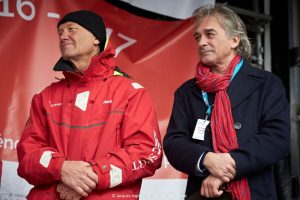
Titouan Lamazou : “This is a great day. We’re always pleased when records are broken The Jules Verne is celebrating its 25th birthday this year. Francis is a great sailor like those, who preceded him, Peter Blake, Robin Knox-Johnson, Franck Cammas, Loïck Peyron… and the others. This is the victory of a crew, which has charmed everyone. They follow in the footsteps of people like Eric Tabarly. They had an exceptional crossing of the Southern Ocean. This is a well-build and well-designed boat and they prepared her well for a short-handed crew. 25 years ago, the goal was 80 days. Now we have to aim for less than 40. We think that lots of sailors will be tempted to try to grab the Trophy that Francis has just won.”
Source : www.idecsport-sailing.com
The fantastic six
Francis Joyon spent the whole day yesterday talking to the media and meeting the public in Brest, where he moored the maxi-trimaran IDEC SPORT after sailing around the world in 40 days, 23 hours, 30 minutes and 30 seconds. Along with his crew of five, he revealed what happened during this circumnavigation. From the magic of a boat appreciated for her ability to sail quickly for a very long time to the lack of hierarchy in the crew and the discreet help from Marcel van Triest.
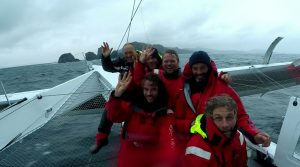
Francis Joyon: “On board, I wanted things to fall into place. It’s vital that the crew pull together and enjoy sailing together. I had a lot of offers, but there were very few places. I chose the human factor. Bernard (Stamm) is almost one of the family and he was the local boy before Sébastien joined us, as he is based in Brest. Clément (Surtel) was key, as along with my son Corentin and myself, he is one of the three members of the team, who worked on the boat. He has the technical know-how that is required. He got on well with Gwénolé (Gahinet), who was part of the team last year and he brought down the average age. The same is true for Alex (Pella) who immediately clicked with me. Sébastien’s arrival was not thought out for as long as he replaced Boris (Herrmann), who is preparing his IMOCA project. Sébastien knows all there is to know about maxi-multihulls.”
“We weren’t aiming for forty days. It was something we couldn’t even have imagined. Beating the record by a minute would already have been an achievement. Some people thought we were having a laugh trying to take up this challenge with such a small crew. It took us about two and a half circumnavigations to beat the record. That is around the same score for all the boats that have attempted the Jules Verne Trophy. Only Bruno Peyron managed it on his first attempt in 1993.”
“In this second attempt of the year, we once again had problems with the Doldrums. But Gwénolé, the eternal optimist, told us things could only get better. By the Cape of Good Hope, we were better placed than in the simulations and then all the doors opened for us. We knew that to beat the record, we would have to stay above 35 knots, which is the speed the front to cross the Indian and a part of the Pacific. We knew that is where the record would be won. We were so motivated that we had several days at around 900 miles. Sometimes, we tried to stay below 40 knots, but we needed to stay ahead of that front.”
Bernard Stamm: “Luck was with us. You have to be lucky for the weather to work out for you. But it was Francis and Marcel, who enabled that luck to help us by setting sail when the weather opportunity appeared. We managed to take advantage of that luck and then go from one system to another. We pushed harder in the Indian. I saw 48 knots at one point, as did my friends. It wasn’t a competition between us. We always did what we could to sail the boat towards the record. Francis placed the cursor lower or higher at times. He was the leader of the band.”
Sébastien Audigane: “Just before the start, I got a call from Francis asking if I’d like to go on board. I had 24 hours to decide. I had to think quickly. I felt at ease with the others, as they too were people, who enjoyed being at sea above all.”
Gwénolé Gahinet: “I joined the project last year for our first attempt. This was something completely new for me. This year, we were better prepared and used to it. It’s fantastic to have found that incredible trajectory and to have sailed so well, particularly in the south with that straight line on the port tack. It required a lot of hard work. It was an exceptional experience and we talked things through a lot, when trimming the boat.”
Alex Pella: “This project was carried out with a lot of freedom for each of us. We all are richer now and learnt a lot from each other. We all respected each other. The feeling was always very positive. It’s not everyday that you get the round the world record.”
Clément Surtel: “Our project adopted a different approach to previous attempts at the Jules Verne Trophy. It was based around being light, rather than power. We performed less well in light conditions, where we would have liked a bigger mast. We have seen recently that flying boats perform well too. In general, it was very physical in the south. It was only once we had got around the Horn that we realised how tired we were by this extreme sailing.”
Marcel van Triest, router, 7th man on board: “From the middle of the Pacific, I could see that the record was possible. But for the past two weeks, I was more in “we could lose it all” mode. There were so many unknown factors and it was very worrying. More than an explosion of joy, it’s more of a huge relief to see them finish.”
Patrice Lafargue, CEO of IDEC: “It’s hugely emotional. I feel overwhelmed, even if I am used to Francis’s achievements. I’m very proud as are my employees to have accompanied him in the Jules Verne Trophy. This small team is made up of real sailors. They are all nice people. I’d also like to congratulate Thomas Coville, who beat Francis’s solo record. An amazing achievement”
Source : www.idecsport-sailing.com
Ovation for Idec Sport team in Brest
Francis Joyon and his five cohorts – the team behind the incredible new Jules Verne Trophy record on Thursday – received a hero’s welcome in Brest. A host of sailing fans and onlookers made the trip out to meet them despite the cold.
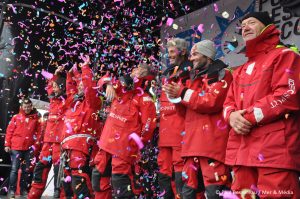
Relive the arrival of Francis Joyon and his teammates, on Thursday morning, in Brest:
Isabelle Trancoen
Joyon and his men shatter the Jules Verne Trophy record
The Maxi Trimaran IDEC SPORT sailed by Francis Joyon, Clément Surtel, Alex Pella, Bernard Stamm, Gwénolé Gahinet and Sébastien Audigane won the Jules Verne Trophy, the outright round the world sailing record, this morning. They crossed the finish at 0749hrs UTC on Thursday 26th January 2017.
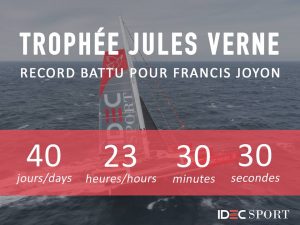
Francis Joyon and his crew sailed the 22,461 theoretical miles in 40 days, 23 hours, 30 minutes and 30 seconds, at an average speed of 22.84 knots. Out on the water, they actually sailed 26,412 miles at an average speed of 26.85 knots.
They shattered the previous record set by Loïck Peyron and the crew of the maxi trimaran Banque Populaire V by 4 days, 14 hours, 12 minutes and 23 seconds. During this round the world voyage, they smashed no fewer than six intermediate records at Cape Leeuwin, off Tasmania, on the International Date Line, at Cape Horn, at the Equator and off Ushant.
Source : www.idecsport-sailing.com
The final 24 hours
As they begin their final full day at sea in this attempt to win the Jules Verne Trophy, IDEC SPORT is heading for Brest at the sort of speeds we have come to expect from her, sailing at full speed on a direct route.
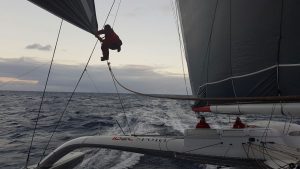
Sébastien Audigane said this morning that they were “climbing up and down the slopes off Lisbon.” 350 miles from Cape Finisterre, Francis Joyon and his men are on the final stretch of their round the world voyage. Sailing at more than 30 knots, they are clocking up the miles and making it look very easy. They are still expected tomorrow morning at the finish line off Ushant, where they will grab the prestigious outright round the world record after just over forty days of sailing.
“Under slightly starry skies, pushed along by a strong southerly, IDEC SPORT is climbing up and down the slopes off Lisbon. We’re on the home strait towards the coast of Finistère. The wind is expected to veer in the Bay of Biscay. The final night of reaching looks rough and wet. For the moment, we are sailing quickly but safely. The seas are not too heavy and we are managing to get some sleep. Everything is fine aboard our mighty race boat.”
Source : www.idecsport-sailing.com

